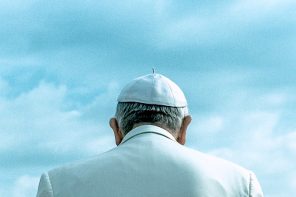An unnamed Republican leadership aide told BuzzFeed yesterday, “Paul Ryan is the Jesus of our conference. If Paul gives something his blessing, it brings the votes.”
For a moment, when I saw the headline, I thought the aide was trying to tap into the Pope Francis frenzy, by suggesting that the Ayn Rand disciple was abandoning the budget-slashing principles that had provoked so much criticism from Ryan’s fellow Catholics. But no, it’s all about the whip count for the budget deal he struck with Democratic Senator Patty Murray yesterday.
Ryan’s compromise, which would reverse damaging sequestration cuts and avoid another government shutdown next year, is being seen as a move to bolster his 2016 presidential prospects. It’s not a WWJD move.
Even before Francis’s papacy and the economic message of Evangelii Gaudium, Catholic theologians and scholars took Ryan to the woodshed for his abandonment of Catholic social teaching in favor of the teaching of Ayn Rand. They argued that America was at a “tipping point where the traditional commitment of our government to protecting and advancing the common good is in very real danger of being dismantled for generations.” They accused Ryan’s defenders, who claimed his economic views were in line with his Catholicism, of going “beyond highlighting the aspects of Catholic moral teaching with which his political positions are laudably consistent, to argue that his Ayn Rand ‘inspired’ individualist and anti-government vision and the policies they inform are themselves legitimately Catholic. They are not.”
Heritage Action and Americans for Prosperity are opposed to the deal, although it looks like Republicans might not roll over for them this time. And the deal doesn’t, by any stretch, address countless aspects of glaring economic inequality; most notably, it does nothing to extend unemployment benefits for the long-term unemployed. In exchange, apparently Republicans aren’t giving up on their opposition to Obamacare, another one of their discordant WWJD policy positions.
Even as Pope Francis seeks to return Catholics’ focus to the church’s social teaching, and to issues of economic inequality rather than sexuality, conservatives in the United States are trying to claim Francis’s apostolic exhortation does not undermine their devotion to free market economics. One of the best examples is the Rev. Robert Sirico of the free market Acton Institute, who released a video attempting to defend his views against Evangelii Gaudium. Best “who, me?” line: “Who is advocating a market without regulations, without law?”
On the Eternal Word Television Network program The World Over last week, Bishop Robert Morlino, the bishop of Madison, Wisconsin, discussed a portion of Evangelii Gaudium in which the Pope writes about welfare and a “welfare mentality.” It seems fairly clear that Francis isn’t being Reaganesque; rather, he advocates for an economic system in which people can have meaningful jobs and vocations, rather than depend on welfare.
Morlino, though, had this to say about it:
He’s saying that once people lose control of major portions of their lives, their freedom to be the best that they can be… including religiously, evidently becomes narrowed. And we see that very clearly in the Health and Human Services mandate that we’re under, where here, as we move to almost a welfare situation in health care, we see that the curtailment of religious liberty and other liberty seems to be part and parcel of a system where that type of life is available to everybody and becomes popular. We should always have a safety net. Health care should always be accessible, basic health care always. But it should be available as a safety net, not as a general lifestyle that almost discourages people from seeking real human flourishing.
The budget deal won’t make these arguments go away. Paul Ryan Jesus-ing the deal through Congress won’t end discussion of his claims that his views are in line with his Catholicism. His critics, though, have a lot more ammunition on their side now. And that might turn out to be the most interesting religion and politics story of the next presidential campaign.




